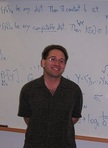My talk at Columbia University: “Computational Complexity and Explanations in Physics”
Last week, I gave the Patrick Suppes Lecture in the Columbia University Philosophy Department. Patrick Suppes was a distinguished philosopher at Stanford who (among many other things) pioneered remote gifted education through the EPGY program, and who I was privileged to spend some time with back in 2007, when he was in his eighties.
My talk at Columbia was entitled “Computational Complexity and Explanations in Physics.” Here are the PowerPoint slides, and here’s the abstract:
The fact, or conjecture, of certain computational problems being intractable (that is, needing astronomical amounts of time to solve) clearly affects our ability to learn about physics. But could computational intractability also play a direct role in physical explanations themselves? I’ll consider this question by examining three possibilities:
(1) If quantum computers really take exponential time to simulate using classical computers, does that militate toward the many-worlds interpretation of quantum mechanics, as David Deutsch famously proposed?
(2) Are certain speculative physical ideas (e.g., time travel to the past or nonlinearities in quantum mechanics) disfavored, over and above any other reasons to disfavor them, because they would lead to “absurd computational superpowers”?
(3) Do certain effective descriptions in physics work only because of the computational intractability of violating those descriptions — as for example with Harlow and Hayden’s resolution of the “firewall paradox” in black hole thermodynamics, or perhaps even the Second Law of Thermodynamics itself?
I’m grateful to David Albert and Lydia Goehr of Columbia’s Philosophy Department, who invited me and organized the talk, as well as string theorist Brian Greene, who came and contributed to the discussion afterward. I also spent a day in Columbia’s CS department, gave a talk about my recent results on quantum oracles, and saw many new friends and old there, including my and my wife’s amazing former student Henry Yuen. Thanks to everyone.
This was my first visit to Columbia University for more than a decade, and certainly my first since the upheavals following the October 7 massacre. Of course I was eager to see the situation for myself, having written about it on this blog. Basically, if you’re a visitor like me, you now need both a QR code and an ID to get into the campus, which is undeniably annoying. On the other hand, once you’re in, everything is pleasant and beautiful. Just from wandering around, I’d have no idea that this campus had recently been Ground Zero for the pro-intifada protests, and then for the reactions against those protests (indeed, the use of the protests as a pretext to try to destroy academia entirely) that rocked the entire country, filling my world and my social media feed.
When I asked friends and colleagues about the situation, I heard a range of perspectives: some were clearly exasperated with the security measures; others, while sharing in the annoyance, suggested the measures seem to be needed, since every time the university has tried to relax them, the “intifada” has returned, with non-university agitators once again disrupting research and teaching. Of course we can all pray that the current ceasefire will hold, for many reasons, the least of which is that perhaps then the obsession of the world’s young and virtuous to destroy the world’s only Jewish state will cool down a bit, and they’ll find another target for their rage. That would also help life at Columbia and other universities return to how it was before.
Before anyone asks: no, Columbia’s Peter Woit never showed up to disrupt my talk with rotten vegetables or a bullhorn—indeed, I didn’t see him at all on his trip, nor did I seek him out. Given that Peter chose to use his platform, one of the world’s best-known science blogs, to call me a mentally ill genocidal fascist week after week, it meant an enormous amount to me to see how many friends and supporters I have right in his own backyard.
All in all, I had a wonderful time at Columbia, and based on what I saw, I won’t hesitate to come back, nor will I hesitate to recommend Jewish or Israeli or pro-Zionist students to study there.
Scott Aaronson's Blog
- Scott Aaronson's profile
- 128 followers



